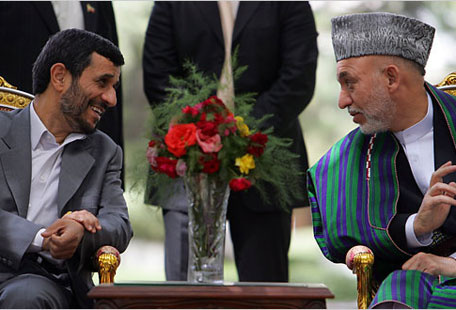Challenge; the Essential and Eternal Flavor of Iran-Afghanistan Relations

IRD: New concerns have arisen in Afghanistan-Iran relations during the recent weeks, all having Washington’s imprint on them. These include violation of Iran's sovereignty by a US spy drone to Iran via Afghanistan, detention of a CIA agent by the Iranian intelligence service, Washington’s allegation about presence of an Al-Qaeda agent in Iran and the Strategic Partnership Agreement between Washington and Kabul. IRD reviews the story in an interview with Ebrahim Taherian, Iran's former ambassador to Islamabad:
IRD: How could the new developments regarding Afghanistan’s strategic pact with the US and Tehran-Washington tensions affect Iran's relations with Afghanistan?
ET: Iran-Afghanistan relations have never enjoyed a stable, crystal clear atmosphere. During the recent three decades, especially at the time of Afghanistan’s occupation by the USSR, the relations have undergone many ups and downs. Whether it was during the rule of the Mujahideen or the Taliban, Tehran-Kabul ties have always suffered certain problems. Following the 2001 occupation of Afghanistan be the US-led alliance, Iran has had to face the challenge of neighboring actually forty neighbors (the NATO troops) instead of one. As a result, the two countries never found an opportunity to improve their relations in healthy conditions.
Mainly because of dysfunctionality of the central government, especially during the past few years, it was inevitable that neighboring 37 to 44 countries, Iran, just as other countries bordering Afghanistan, would face security challenges and receive nothing but the problems imposed by Kabul’s unique problems. Iran has to endure much, especially due to the drug trafficking problem. With extraregional countries present with their military, intelligence and security forces in Afghanistan and Kabul’s incompetence to maintain security, even of high-ranking political authorities such as Burhanuddin Rabbani, and even the capital’s Green Zone, there’s no need to hesitate over how dire the state of security is in other parts of the country. The points you mentioned and the expenses imposed on Iran, including on narco-traffic, are all related to these weaknesses.
IRD: A national alliance has announced its formation in Afghanistan during the recent weeks, and it is led by anti-Karzai politicians. Do you think domestic developments have significant impact on Kabul-Washington relations? For example, could we say that it is the domestic pressures which drive Karzai closer towards Washington?
ET: The foundation of this front might have been the most important event in Afghanistan’s domestic politics. The alliance includes recognized jihadists and it may be a new hope to improve the prospect of Afghanistan. With the 2010 presidential poll in which the government and Hamed Karzai lost a considerable portion of their legitimacy due to poorly-managed elections, this alliance will play an important role in the political future of Afghanistan. Abdullah Abdullah -Karzai’s main contender in the last presidential election- has asked his supporters to be ready for the next election.
The new national alliance can be a ray of hope for Afghans due to the high stature of its founders among various ethnicities and sects of Afghanistan. Unlike the religious extremist opposition, the alliance seeks supra-ethnic and supra-religious unity for the country and adheres to the constitution.

